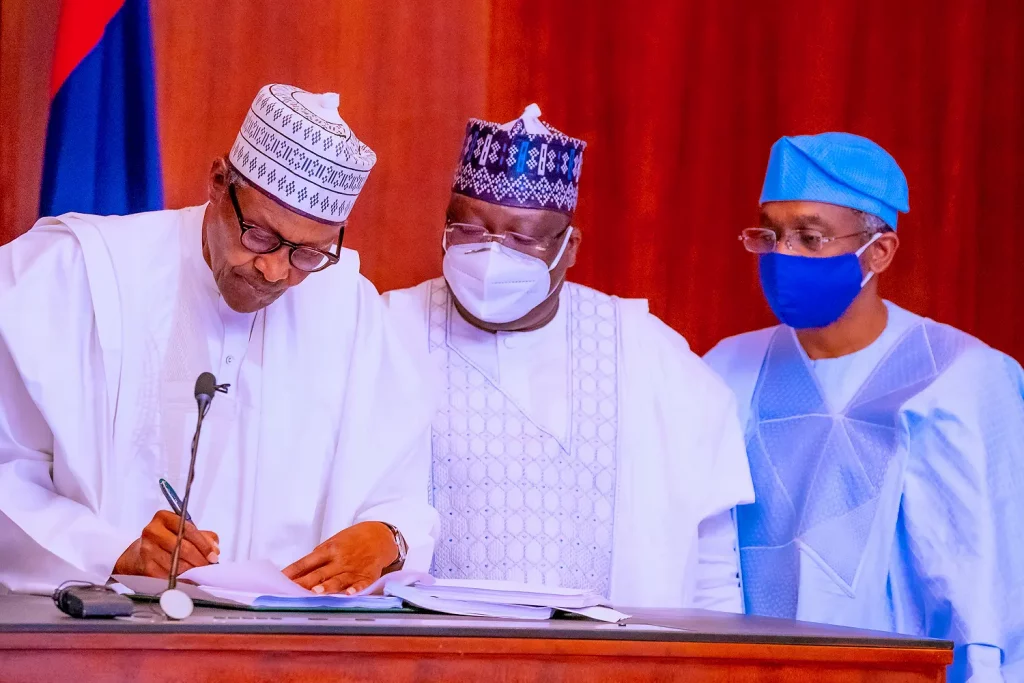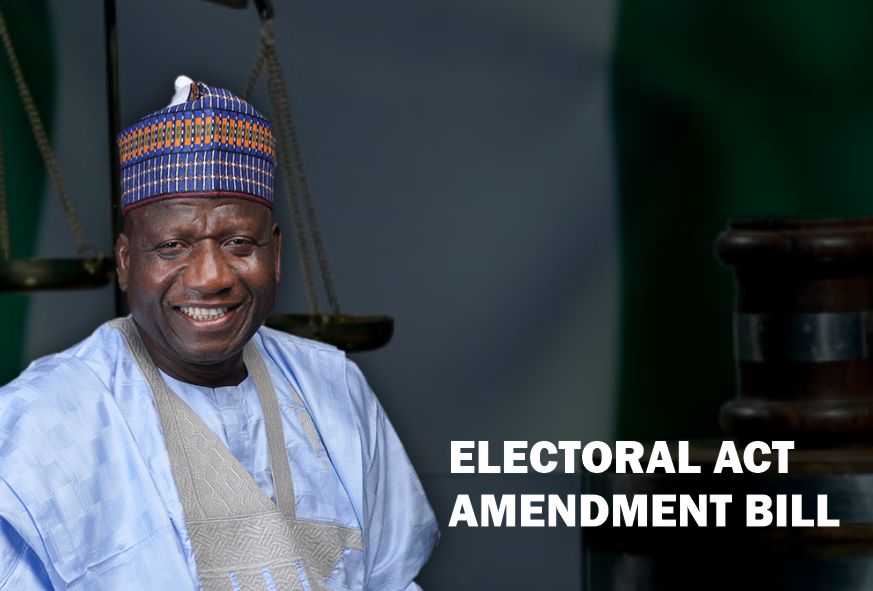B
BEING TEXT OF A PRESS BRIEFING DELIVERED BY THE NATIONAL CHAIRMAN, INTER-PARTY ADVISORY COUNCIL, IPAC FOLLOWING THE HISTORIC SIGNING OF THE AMAENDED ELECTORAL ACT BY PRESIDENT MUHAMMADU BUHARI ON FRIDAY, 25TH FEBRUARY, 2022.

PROTOCOLS:
With the signing of the amended electoral act by President Muhammadu Buhari, Nigeria has recorded a remarkable and epochal milestone in the nation’s history of democracy. It is a watershed moment marking a fundamental and revolutionary departure from the agelong order of practices in the nation’s electoral processes. with the new electoral act, Nigerians can optimistically, look forward to a glorious dawn under which, the conduct of elections in the country, can measure up to the global best practices. With the electoral act in place, for example, we can confidently assume that gone forever and for good, is the era where elections are more of rituals for the anointing of political leaders instead of being a process and opportunity for citizens to elect their representatives as political leaders.
For too long, political opportunists and scavengers have exploited loop-holes in the nation’s electoral laws, regulations to manipulate elections in favour of themselves or, their cronies. Invariably, because they are not reflective of the people’s desires and choice, governance has been carried out with impunity and reckless abandon. Consequently, while the masses have continued to suffer a vagary of bad and incompetent of incompetence, the country as a whole has been experiencing retardation and retrogress in almost in all facets retrogression in all facets. Also, the brazen and blatant subversion of the electoral processes have unfortunately, earned Nigeria in opprobrium and ridicule and stigmatization in the comity of democratic nations of the world.
As a result of the corruption and malfeasance in the electoral system in which votes did not count and the expression of the electorate at the polls do not translate into the emergence of quality representations in political, authorities and positions the ambitions and expectations of citizens with the return of democracy in 1999 have been wholesomely dashed. In terms of security, which is one of the cardinal responsibilities of government, Nigerians have been experiencing a situation of ever-worsening security of lives and property in the past twenty-two years of democracy. To mention but a few, Boko Haram, the Islamists insurgency in the north-East region, has become a hydra-headed monster since the murderous vampire reared its head in 2009. The plagues of armed banditry, kidnapping and senseless inter-communal wars, especially, in the North-West and North-Central and generally, in the other regions of the country, have since added to the state of insecurity in the country.
In the economic sphere, the advent of democratic governance has not translated into improved well-being and living conditions of the generality of the populace. Poverty and economic ruination have reached such an alarming proportion that Nigeria have since been classified as one of the poverty capitals of the world. Paradoxically, this unsavoury situation is coming against the backdrop of increased revenue which has accrued to the various governments since 1999 as well as, the staggering loans the country has been obtaining in the name of infrastructural development all these years.
There is no gain saying the fact that the gloomy scenario highlighted above, could have been positively different if, for instance, the rules and regulations guiding the electoral process had not provided the rooms for manipulation and abuse by elements that are deficient in their democratic credentials, patriotism, vision and commitment to the people’s welfare and development of the nation. With the Electoral Act and its revolutionary provisions and innovations, there are silver-linings appearing on the nation’s political and democratic firmaments. It is a transformational departure from an inglorious era to a new dawn in the ways and manner of conducting elections in Nigeria.
Highlights of the new Electoral Act that inspire hope includes, the clause that stipulates that fund for general elections must be released at least, one year before the elections. This, in the opinion of IPAC, will provide the Independent National Electoral Commission, INEC, the requisite time-span and scope for proper and adequate preparations without the usual encumbrances resulting from delays and red-tapes experienced in the remittance of funds from the government. This is just as Section 94 of the Act stipulates early commencement of campaign seasons at least, 150 days to elections. This provision has the advantage of giving the political parties and candidates, sufficient time to get to the electorate with their manifestos.
Equally exciting in the new Electoral Act is the provision that empowers political parties to conduct a primary election to replace a candidate who died in am election. Going down memory lane, this clause has put paid to the quagmire experienced in the situation where a particular candidate had died at the peak of a gubernatorial election in one of the states. The new powers conferred on the INEC by the Act to review results of elections declared under duress, is another progressive innovation that will capable of staving off the acrimonies and avoidable litigations usually attendant on such incidents.
With the electronic transmission of election results from the polling units through to the collation centres, we in the IPAC are confident that the practice of distorting figures of votes cast, may have become history. Also very pertinently, we believe that the provisions in the Act for the application of the Bimodal Voters Accreditation and Authentication System, BVAS, as well as the other technologies and digitization in the electoral process, will tremendously enhance the integrity and credibility of future elections in the country.
Finally, IPAC, along with all progressive-minded Nigerians and concerned members of the global community, are elated by Clause 54 of the Electoral Act 2022 which makes it mandatory for the INEC to make special provisions for people living with disabilities, PLWDs and those with Special Needs. This Clause has broadened the scope of inclusiveness as it has largely eliminated the long exclusion of the large population of PLWDs from participating in the electoral and voting processes.
On the whole, the leadership and the entire members of the Inter-Party Advisory Council, IPAC, are cognizant of the critical roles played by certain individuals and institutions in the making and actualization of the latest historic amendment of the Electoral Act. In this regard, we particularly wish to commend President Muhammadu Buhari for the statesmanship, political will and commitment to the advancement of democracy in the country by assenting to the Act. This is because we ae not unaware of the tremendous pressure mounted on him by several interests opposed to the Act on the ground that the transformative and progressive provisions of the new election regulatory rules, will amount to the erosion of their capabilities to manipulate the electoral process. With this singular act, Mr. President has succeeded in etching his name in gold in the annals of the nation’s march on the path of democracy and good governance that is consequent on credible elections.
IPAC will also commend the leadership and members of the 9th National Assembly for their courage, patriotism and resilience demonstrated in the nurturing, perfection and passage of the new Electoral Act. We are very impressed that for once, the nation’s lawmakers came together in an unprecedented unity of purpose in the superior interest of democracy, the country and future generation of Nigerians. In time to come, we are convinced that the present crop of the leadership and members of the two chambers of the National Assembly, will be extolled and celebrated for defying all the intimidation and harassment and eventually, succeeding in bequeathing the golden rules in the conduct of elections as contained in the Electoral Act.
Very significantly, IPAC wishes to once again, commend the leadership of the Independent National Electoral Commission, INEC, ably led by Professor Mahmud Yakubu, for the uncommon courage, steadfastness and vision shown in the crafting and actualization of the Electoral Act, 2022. Without the robust courage and resilience, the Commission would have succumbed to the brazen acts of subversion and machinations by the multitude of retrogressive interests and groups that did not want the innovative provisions of the Act to see the light of the day.
Barely twenty four hours after the Presidential assent,, INEC swung into action by announcing new dates in its time table for the 2023 general elections. With a shift of one week on each of the schedules in the countdown to the elections,INEC has all the same, deftly ensured that the adjusted time table is in line with the provisions of the Electoral Act 2022.
To us in IPAC, the swiftness shown by INEC is yet another commendable action that has further raised our long held confidence in the zeal, diligence and commitment of the Commission in the dispensation of its assignment. We enjoin the other stakeholders to brace up to the pace being set by INEC so as to enhance overall success of the exercise.
On the whole, the Inter-Party Advisory Council is advocating that all hands must be on deck to ensure that the revolutionary and transformative provisions of the Act go beyond mere paper work to realties in the conduct of elections in the country. In this regard, we enjoin the relevant authorities to abide by the provisions of timely appropriation and release of funds to INEC to make for early and adequate preparations.
We are calling on INEC to take full advantage of the Act through scrupulous and dedicated implementation. Because to whom much is given, much is also expected, the Commission must now realise that the ball is in its court as Nigerians and the entire world look up to it for future elections characterized by integrity, credibility and less acrimonies.
On their part, our members, the political parties, as strategic and key stakeholders in the nation’s democratic project, it is incumbent on them to ensure strict compliance to the new Electoral Act by playing the game according to the rules. As the hub around which democracy and representative governance revolves, we as political parties, cannot afford to fail in the discharge of our responsibilities of deepening the roots and structures of democratic institutions for enhancement of the progress of the country and the well-being and happiness of the present and future generations. More than any other player, we owe it a cardinal responsibility to actively collaborate with the Independent National Electoral Commission in the implementation of the new Act. This calls for suppression of self-centredness and the enthronement of the superior and more rewarding interests of the nation.
Gentlemen of the press, I cannot end this briefing without making a reference to the reservations made by the President regarding Section 84(12) of the new Electoral Act. We share the views of the President on the Clause which makes it mandatory for political appointees to resign from their positions before participating as delegates at political party congresses and conventions or, as aspirants to elective offices. To us in IPAC, this Clause runs contrary to the provisions of Sections 40 and 42 of the Constitution on the inalienable fundamental rights of every eligible citizen to participate in the electoral processes.
Accordingly, the IPAC is calling on the National Assembly to as a matter urgency, initiate the process of amending the new Act by expunging the contentious Clause. While doing so will be in keeping with the understanding between the National Assembly and the President, the amendment will also be bringing the Act in tune with the Constitution which categorically stipulates that political office holders are only to vacate their positions or appointments, thirty (30) days before the elections.
Gentlemen of the press, IPAC is congratulating all Nigerians as we celebrate the birth of the historic, long-awaited Electoral Act, 2022. It is a watershed, a positive turning point in the nation’s democracy.
Thank you.
ENGINEER YABAGI YUSUF SANI
NATIONAL CHAIRMAN,
IPAC.

